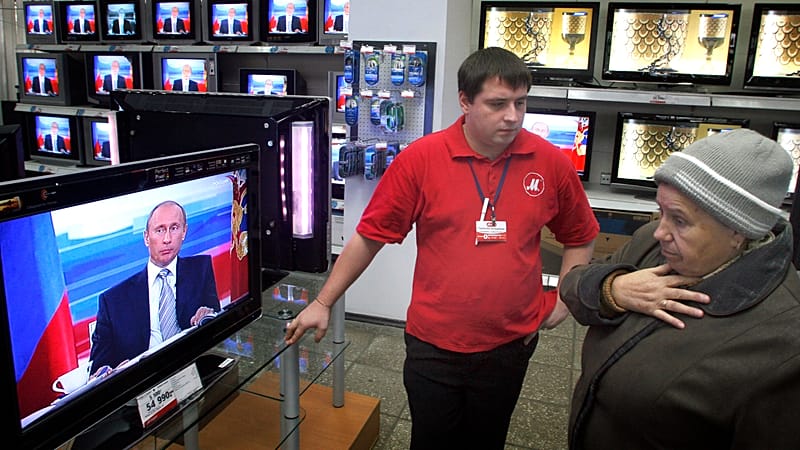Spanish investments dipped sharply since full-scale invasion of Ukraine

Bilateral trade between Spain and Russia has shrunk in value, signalling a clear decision to decouple from the sanction-ridden nation.
The Kremlin's decision to launch a full-scale invasion of Ukraine almost four years ago has had an undeniable effect on Spanish companies that aspired to open up markets in Russia, with the result that the volume of their exports has plummeted sharply since the beginning of the conflict.
In 2021, total Spanish exports to Russia were valued at €2.2 billion, while last year that figure stood at just €783 million according to data from the Spanish Chamber of Commerce. These figures reflect a fall of more than 64%.
The number of Spanish companies exporting to Russia has also declined over the years. According to the Spanish Chamber of Commerce, there were around 670 such companies in 2021, 399 in 2022, and just 158 by 2023.
Euronews contacted the Spanish Economic and Commercial Office and the Spanish Embassy in Moscow, which declined to comment on the issue.
The disinvestment push by the Spanish economy is due, according to experts, to the invasion of Ukraine and the severe sanctions currently weighing on Russia, which have affected key variables such as access to raw materials, demand and inflation rates.
Since the beginning of the all-out war in February 2022, both the European Union and the United States have imposed numerous sanctions on the Kremlin, which have limited everything from their ability to transfer money to the ease with which they travel to the country.
The European bloc decided last July to penalise Russian gas and banned the direct and indirect use of the Nord Stream undersea pipelines.
More recently, the US announced a new set of sanctions against Russia's two largest oil companies, Rosneft and Lukoil, to pressure Moscow to sit down and negotiate a peace deal.
Imports to Spain persist despite sanctions
Trade relations between Spain and Russia are concentrated mainly around LNG. However, Spanish imports of aluminium and fertilisers are also significant.
A report by the Spanish central bank published in 2024 showed that, despite EU sanctions, Russia’s share of Spain’s extra-EU LNG imports rose from 18% to 36% between 2022 and the second quarter of 2024.
However, by May 2025, the country increased its LNG imports from the US and decreased its Russian gas imports to 13.3% of Spain's total imported gas in the first four months of this year, down from 22.4% in the same period last year.
Another key category of Russian imports to Spain has also recorded increases, with fertiliser imports growing significantly in 2024, according to a S&P Global report, with urea and calcium ammonium nitrate even reaching record levels.
That made Russia Spain’s second-largest supplier of nitrogen fertilisers last year, raising concerns in Europe about the continued dependency on Russian imports and calls for potential tariffs.
Bilateral trade is declining
Despite the figures above, the latest data from the Spanish Chamber of Commerce shows a clear drop in Russian trade with Spain. During the first seven months of 2025, imports reached €1.2 billion, compared to the same period in 2024, when they amounted to €1.45 billion.
Exports also gradually shrank. During the same period last year, they were valued at €468 million, whereas in the period between January and July 2025, they came in at €425 million.
In an annual comparison, export values in euros dropped from €2.2 billion in 2021 to less than €800 million by 2024.
Trade between the two countries continued to shrink in August, according to the Observatory of Economic Complexity. In a yearly comparison, Spanish exports to Russia decreased by 14.3% and imports fell by 57.7% in August 2025 compared to the year before.
According to the OEC, the main Spanish exports to Russia in August included perfumes, processed vegetables and vaccines, among others. The main Spanish imports from Russia were petroleum gas, raw aluminium and nitrogenous fertilisers.
The trade of the latter fell by more than 40% compared to a year earlier, whereas petroleum gas imports shrank by 60%, according to OEC.
The Economic Complexity Observatory, a trade analysis platform developed by the Massachusetts Institute of Technology (MIT) and Harvard University, collects and visualises data on global foreign trade flows.
It aims to provide an accurate snapshot of each country's economic evolution and its level of productive diversification.
In its most recent report, the OEC confirms that trade between Spain and Russia has remained at minimal levels since the start of the war in Ukraine and the European sanctions against Moscow. Even so, some sectors — such as pharmaceuticals and agri-foodstuffs — continue to sustain part of the trade, although well below pre-2022 volumes.

